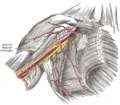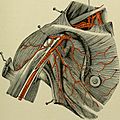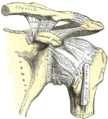Shoulder facts for kids
Quick facts for kids Shoulder |
|
|---|---|
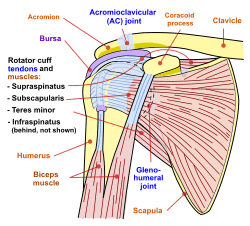 |
|
| Diagram of the human shoulder joint | |
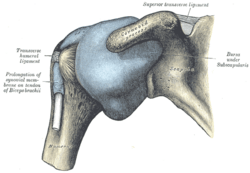 |
|
| Capsule of shoulder-joint (distended). Anterior aspect. | |
| Latin | articulatio humeri |
| Gray's | subject #81 313 |
Your shoulder is an amazing part of your body! It's made up of three main bones: the clavicle (which you might know as your collarbone), the scapula (also called the shoulder blade), and the humerus (your upper arm bone). But it's not just bones! Your shoulder also has muscles, ligaments (which connect bones), and tendons (which connect muscles to bones).
The places where these bones meet are called joints. The main shoulder joint is where your humerus connects to your scapula. The top of your humerus fits into a special cup-shaped part of the scapula called the glenoid fossa. When we talk about the "shoulder" as a whole, we mean all the parts that work together in that area.
Contents
What is Cartilage?
Inside your shoulder joint, there are two kinds of special material called cartilage. Cartilage is a smooth, rubbery tissue that helps your bones move easily.
Articular Cartilage
The first type is white cartilage, found on the ends of your bones. This is called articular cartilage. It helps the bones glide and slide against each other without friction. Think of it like a super-smooth surface that lets your arm move freely. If this cartilage starts to wear out, a condition called arthritis can happen. This can make the joint feel painful and stiff.
The Labrum
The second type of cartilage in your shoulder is called the labrum. It's different from the articular cartilage. The labrum is tougher and more like a strong ring. It's found only around the edge of the socket where your arm bone fits. The labrum helps to make the socket deeper and more stable, keeping your arm bone securely in place.
Why is the Shoulder So Special?
Your shoulder needs to be super flexible so you can move your arms and hands in many ways. Imagine throwing a ball, reaching for something high up, or even just scratching your back! At the same time, your shoulder also needs to be strong and stable. It has to handle actions like lifting heavy things, pushing, and pulling.
Finding the right balance between being able to move a lot (mobility) and being strong (stability) is tricky for the shoulder. This is why shoulders can sometimes have more problems than other joints, like your hip. Your hip is very stable, but it doesn't have the same huge range of motion as your shoulder.
Images for kids
-
The brachial plexus is a group of nerves that sends signals to your shoulder and arm.
-
Anatomical studies of the shoulder by Leonardo da Vinci (around 1510).
See also
 In Spanish: Hombro para niños
In Spanish: Hombro para niños


